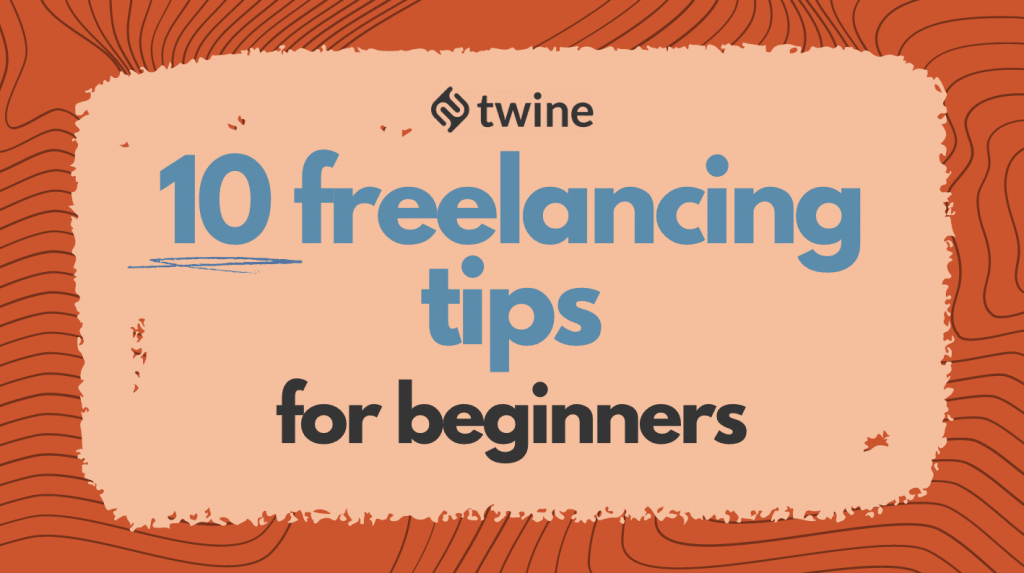
Before you begin on the wonderful freelancing journey, you need to make sure you’re well equipped with all things freelance. At Twine, we’ve gathered together our most vital intel, to bring you these top-quality freelancing tips for beginners.
These freelancing tips won’t only help you in the early stages of your career, but also later on when you’re fighting those hungry clients off!
But hey, let’s not get ahead of ourselves just yet. The road from beginner to professional creative is a rocky one.
Although we will be there to support you as much as possible, there may be occasions where you have to make some quick decisions. To help you go through the ultimate freelance learning process, without further ado: here are the 10 best freelancing tips for beginners!
#1 Failures = learning curves
We all make mistakes when we’re just starting out.
We may feel like idiots at the time, but making mistakes is the best way to learn – think of it this way, you’ve learned that that particular way doesn’t work, and you’ve learned not to do it again. Score!
If you never make mistakes, you’ll never move forward. Making a mistake with one thing means that the next time you make something, it will be a little better.
Contrary to popular myth, Newton did not come up with the theory of gravity the instant the apple struck his head: it takes a lot of mistakes to create something great...
#2 Don’t compare yourself to others

We all have people in the industry that we aspire to be.
It can be really tempting to compare yourself to them, but this is the fastest way to get discouraged and unhappy. Those people have already been through this process: they’ve made mistakes, failed, and got back up again.
That’s the most important bit: they got back up again.
Now, they’re pros. They know exactly how not to fail because they’ve already failed so many times!
If you’re just starting out, your work is never going to be as good as your peers. It takes years of hard work and practice. It’s important to remember that you will get there – just be willing to practice, and trip up a little on the way.
#3 Less is more
Ever hear the phrase “all the gear – no idea“?
Basically, it means you can’t cheat this kind of freelancing thing. Suddenly ordering a stack of shiny new equipment won’t make you a pro overnight, no matter how much you pay!
Instead, start out by learning one or two tools really well, then start branching out. This is often called micro-learning, which you can see examples of here.
#4 Being a “natural“

Being talented at something is sometimes referred to as having a gift in that particular skill set. And maybe, in some ways, it is. But, you shouldn’t immediately discredit and turn your back on something if you don’t pick it up immediately.
You won’t be able to create great works of art straight away, and telling yourself you can set yourself up for a nasty fall. Be kind to yourself, and don’t apply too much pressure.
It’s an exciting time to learn new skills, so make sure you’re giving yourself the care and devotion you deserve – and no beating yourself up if things don’t go your way!
#5 Learn to say “no“
When you’re working with other creatives, clients, or industry professionals for the first time it can be intimidating – we get it.
However, this is one of the most vital freelancing tips for beginners, so pay close attention: learn to say no.
Even if you feel under pressure to say yes to all their requests or even take on work that you can’t finish before the deadline.
Unfortunately, there will be some clients out there who will try and get you to do as much as possible for less money. Not everyone has your best interest at heart.
So, be wary and stand your ground. Know your limits and don’t take on more work than you can handle, as well as the rates you accept.
#6 Copying doesn’t always mean stealing

Now, before you run to the comments section to type angrily away – hear us out.
Everyone copies. Yes, that’s right!
All good art forms borrow and copy ideas from other artists. What makes a good artist, is taking an existing idea and making it their own through methods of adapting and creation.
Borrowing or copying part of an idea from another artist and changing it for your own work is not stealing, you just have to make sure you aren’t taking someone else’s work – line for line – and trying to portray it as your own.
But, before you go browsing the archives of creative freelance portfolios, make sure you’re giving credit where credit’s due. Not referencing your source of inspiration is a huge no-no, and in this case, imitation is not the best form of flattery.
#7 Be professional
Yes, working in the creative industries is cool.
We don’t have to wear a uniform or work in a cubicle, and sometimes we do Free Donut Fridays, but that doesn’t mean we shouldn’t be professional!
Even if you’re working on the most fun and silly project you could possibly imagine – you need to remember that this is business. You’re being paid to provide this service, so make sure the task is a) completed to the best of your ability, and b) with the respect and professionalism it deserves.
Oh, and if you’re working on a project with someone you don’t see eye-to-eye with, that still isn’t an excuse to lose your professionalism.
In this instance, stay cool and calm, remaining in a manner that’s respectful and courteous. The creative industries have tight-knit networks and you don’t want to be known as the person who bad-mouths your co-workers.
#8 Learn your craft

Number eight of our freelancing tips for beginners: never stop learning.
As industries go (e.g. healthcare, IT support, etc), the creative industries are constantly changing. There are always new skills, new trends, and new fashions so make sure you’re always learning and trying new things. The minute you stop learning new things, you’ll start to stagnate and requests for work will stop coming through the door...
#9 Get feedback
It can be scary, but, seek out feedback from your peers – it will change your life.
Your first work won’t be perfect, and getting feedback will enable you to identify the areas you need to improve.
Also, don’t take negative comments to heart, usually, people are just trying to help. The first step on this road is admitting that, right now, your work isn’t perfect. But don’t worry, it will be, in time.
#10 Have fun!

So far we’ve talked about how you’re going to make loads of mistakes, fail, and how it’s going to take ages for you to be good at your craft.
But don’t get down, you’ll be having loads of fun along the way too!
It’s a privilege to be working in the creative industries – your passion is your day job. As long as you enjoy yourself, mistakes, learning, and even failure won’t seem like so much of a big deal…
Ready to hire? Our marketplace of over 410,000 freelancers has the skills and expertise needed to skyrocket your business to the next level. From marketers to designers, copywriters to SEO experts – browse the talented bunch here!



